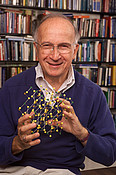Profiles of Leading Women Scientists on AcademiaNet.
Members
List of Members | Expert Search
Search among the members of the Leopoldina for experts in specific fields or research topics.

Roald Hoffmann
Nobel Prize in Chemistry 1981
| Year of election: | 2000 |
| Section: | Chemistry |
| City: | Ithaca, NY |
| Country: | USA |
CV Roald Hoffmann - English (PDF)
Research
Research Priorities: electronic structure of molecules, molecular orbitals, theory of shapes, spectra and reactions of molecules, organic, inorganic and extended structures, behaviour of matter under high pressure, chemistry teaching, literature
Roald Hoffmann is a US chemist and author. For his research on chemical reactions he received the Nobel Prize in Chemistry in 1981, together with Kenichi Fukui from Japan. He has also written poetry and non-fiction books on the connections between chemistry, philosophy and poetry.
Roald Hoffmann’s research is focused on applied theoretical chemistry, developing mathematical or computer-simulated methods for calculating simple orbital-based explanations from electron structures which can be applied to all fields of chemistry. Together with US Chemist Robert B. Woodward, Hoffmann developed the “Woodward‐Hoffmann rules”, a set of quantum mechanical rules that can be used to predict the simplicity or difficulty of certain chemical reactions. The “Woodward‐Hoffmann rules” were developed based on the total synthesis of vitamin B12 carried out by Woodward. Unusual ring closure reactions that were observed experimentally led Woodward and Hoffmann to the so-called rules of symmetry. These rules are an important way of predicting suitable conditions for certain organic reactions (pericyclic reactions) and the stereochemistry (three-dimensional structure of atoms) of their products.
Throughout his scientific career, Roald Hoffmann has always considered himself to be a teacher and pedagogical considerations are of particular importance to him in his research. Thus, he asks how chemistry is “made” and what function it has in culture and society. These reflections have led to numerous essays and books on the philosophy of science and ethics. As an author he also publishes poetry, essays, books and plays, thereby building a bridge between science, philosophy and poetry.
Career
- 1996 Professor of Humane Letters, Cornell University, Ithaca, USA
- 1974 Professor of Physical Science, Cornell University, Ithaca, USA
- 1968 Professor of Chemistry, Cornell University, Ithaca, USA
- 1965 Associate Professor, Cornell University, Ithaca, USA
- 1962-1965 Junior Fellow, Harvard University, Cambridge, USA
- 1962 Doctorate, Harvard University, Cambridge, USA
- 1960-1961 Visiting Student, University of Moscow, Moscow, USSR
- 1958 BA in Chemistry, Columbia University, New York City, USA
- 1955-1958 Degree in Chemistry, Columbia University, New York City, USA
Functions
- 1987-1990 Member, Council, National Academy of Sciences (NAS), Washington D.C., USA
- 1970-1974 Member, Advisory Panel, Chemistry, National Science Foundation (NFS), Washington D.C., USA
- Member, Board of Overseers, Chemical Heritage Foundation, Philadelphia, USA
Honours and Memberships
- 2017 Primo Levi Prize, German Chemical Society (GDCh) and Societa Chimica Italiana (SCI), Rome, Italy
- 2011 Otto Warburg Lecture, Otto Warburg Chemistry Foundation, University of Bayreuth, Bayreuth, Germany
- 2011 Lomonosov Gold Medal, Russian Academy of Sciences (RAS), Russia
- 2009 James T. Grady-James H. Stack Award for Interpreting Chemistry for the Public, Washington D.C., USA
- 2008 Lichtenberg Medal, The Göttingen Academy of Sciences and Humanities in Lower Saxony, Göttingen, Germany
- 2006 Gold Medal, American Institute of Chemists (AIC), Philadelphia, USA
- since 2002 Honorary Member, Chemical Society of Japan, Japan
- since 2000 Member, German National Academy of Sciences Leopoldina, Germany
- since 1999 Honorary Member, GDCh
- since 1998 Corresponding Member, North Rhine-Westphalian Academy of Sciences, Düsseldorf, Germany
- 1996 Pimentel Award in Chemical Education, American Chemical Society (ACS), USA
- 1994 Centennial Medal of the Graduate School of Arts and Sciences, Harvard University, Cambridge, USA
- 1990 Priestley Medal, ACS, USA
- since 1989 Honorary Member, The Royal Institution, London, USA
- since 1988 Foreign Member, Finnish Academy of Science and Letters, Finland
- since 1988 Foreign Member, Academy of Sciences of the Soviet Union, USSR
- 1986-1987 Tage Erlander Professor, Swedish Research Council, Stockholm, Sweden
- 1986 Joseph Priestley Award, Dickinson College, Carlisle, USA
- 1986 Sciences Award in the Chemical Sciences, National Academy of Sciences, USA
- since 1985 Foreign Member, Royal Swedish Academy of Sciences, Sweden
- since 1984 Foreign Member, Royal Society, UK
- since 1984 Member, American Philosophical Society, USA
- 1983 National Medal of Science for Chemistry, Presidential Committee on the National Medal of Science, USA
- 1982 Prize in Inorganic Chemistry, ACS, USA
- 1981 William H. Nichols Medal, New York Section, ACS, USA
- 1981 Nobel Prize in Chemistry (shared with Kenichi Fukui), Royal Swedish Academy of Sciences, Sweden
- 1978 Guggenheim Fellowship, John Simon Guggenheim Memorial Foundation, New York City, USA
- since 1978 Member, International Academy of Quantum Molecular Sciences (IAQMS)
- 1973 Arthur C. Cope Award in Organic Chemistry (shared with R.B. Woodward), ACS, USA
- since 1972 Member, National Academy of Sciences, USA
- since 1971 Member, American Academy of Arts and Sciences, USA
- 1970 Prize, IAQMS
- 1969 Award in Pure Chemistry, ACS, USA
- Roald Hoffmann has been awarded more than 30 Honorary Doctorates.

